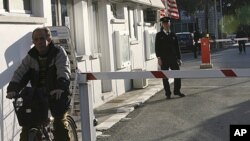Hopes of a breakthrough in reuniting Cyprus are diminishing after a year of talks and little progress, but the United Nations will host a second round of negotiations Thursday in Geneva. Failure of the talks could result in a permanent partition of the island, which could also end Turkey's European Union aspirations.
Time is scarce
U.N. Secretary General Ban Ki moon is due to sit down in Geneva with the leaders of the Turkish and Greek Cypriot communities to map out a schedule for efforts to reunite the divided island. These latest U.N. efforts started more than a year ago and have made little progress, according to observers.
But Carnegie Institute visiting scholar Sinan Ulgen, who heads the Turkish-based research group Edam, warns that time maybe running out to reunite the island.
"This will be the last attempt of the international community to settle the issue," said Ulgen. "Already [in] 2004 there was such an attempt, which ended up a failure, and now [in] 2011 we see a renewed attempt. If this also fails Turkey's position will shift on Cyprus, to actually, on the basis of its growing soft power in the region, to lobby for the recognition of the Turkish republic of northern Cyprus and basically seal the division of the island."
Only the Greek side of Cyprus is recognized internationally. The island has been divided since Turkey invaded in 1974 following a Greek-inspired coup. The Turkish Republic of Northern Cyprus, which is subject to an international economic embargo, is only recognized by Turkey.
But the latest efforts by U.N. Secretary General Ban are facing an uphill struggle. Greek Prime Minister George Papandreou who supported the previous U.N. secretary general Kofi Annan's attempts to reunite the island is no longer in a position to offer such support.
"Although Papandreou is the person who took enormous personal risks to support the Annan plan and never backed off from his position, I cannot see much of initiative coming from him given the very difficult domestic position in Greece," noted Greek scholar Ioannis Grigoriadis of Turkey's Bilkent University. "I do not think he will be an obstacle to a solution if a solution comes. But it will be very difficult for him to make more enemies in his party and the country overall by launching a very ambitious Cyprus agenda at this point."
The U.N. Annan plan was also strongly supported by Turkish Prime Minister Recep Tayyip Erdogan. In a 2004 referendum it was accepted by the Turkish side of the island, but rejected by Greek Cypriots.
Old divisions remain
With the Greek Cypriot side of the island being an EU member, Turkey's membership aspirations are seen as tied to reuniting the island. But according to Senior Turkish diplomat Selim Yenel, Turkey will not make any more concessions.
"It has always fallen on Turkey to give concessions, and we have this is enough, we have given enough concessions," said Yenel. "We have tried everything, but every time we have done so, the Greek Cypriots have put them in the pocket and have asked for more. If we do it again they will just pocket it and ask for something else. This has been basic policy. They have always relied on the European Union, on other big countries, to put pressure on us. Well it is not going to work anymore."
Observers say such a robust stance is a reflection of the changing balance of power between Turkey and the European Union. Turkey's membership bid is at a virtual standstill, in part due to Cyprus as well as opposition from both Germany and France. But with the European Union facing economic disarray and Turkey's fast growing economy the allure of membership is fading, according to Ulgen.
He says that means Ankara can take a tough stance, even pushing for full recognition of the Turkish Republic of Northern Cyprus (TRNC).
"Under those conditions Turkey's EU prospects would come to an end," Ulgen added. "But the fact the EU has lost its public appeal and the Turkish government has lost is zeal for EU accession changes the frame work for the Turkish government, and makes it more accessible for the Turkish foreign policy to pursue the full recognition of the TRNC."
But Ulgen argues the real prospect of a permanent partition of the island may yet provide the impetus for the two communities to reach an agreement.
With the Greek Cypriots due to take over the six-month EU presidency on July 1, 2012, it appears that date has become the deadline for a deal to be struck.




